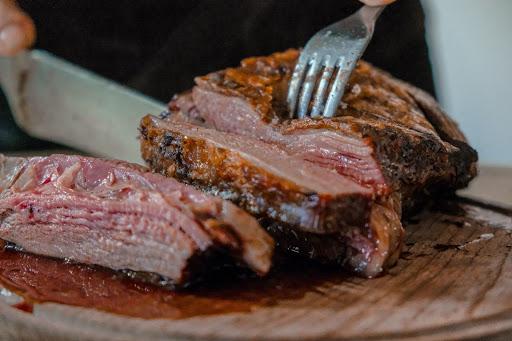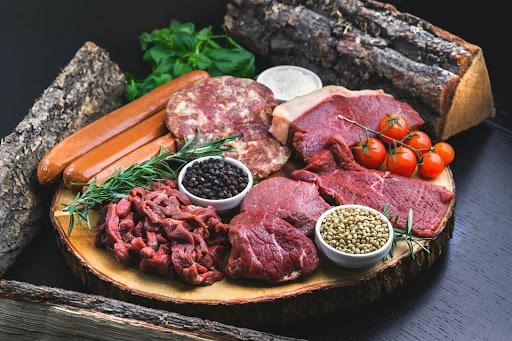
In the vast tapestry of global cuisine, the diversity of meat varieties stands as a testament to the rich and varied culinary traditions that have evolved over centuries. The exploration of different meats is not merely a gastronomic adventure; it is a cultural odyssey that enriches our palates and broadens our understanding of culinary arts. From the succulent lamb chops of the Mediterranean to the flavorful kangaroo steaks of Australia, each meat variety brings its own unique texture, taste, and cultural significance to the table. In this article, we delve into the reasons why exploring different meat varieties is essential for enhancing culinary diversity and creating a more vibrant and inclusive gastronomic experience.
Flavorful Journeys
Embarking on a culinary journey that embraces a variety of meats opens up a world of flavors that tantalize the taste buds and awaken the senses. Each meat type possesses its distinctive taste profile, influenced by factors such as the animal’s diet, habitat, and preparation methods. For instance, the rich, gamey taste of venison offers a unique experience that contrasts with the tender juiciness of pork. By incorporating different meat varieties into our culinary repertoire, we unlock a treasure trove of flavors that reflect the diverse landscapes and traditions from which these meats originate. This not only elevates our dining experiences but also pays homage to the global tapestry of food culture.
Breaking Culinary Boundaries
The exploration of various meat varieties is a celebration of cultural fusion, where diverse culinary traditions come together on a single plate. Each region boasts its prized meats, deeply rooted in local customs and traditions. For instance, the Argentinean love for beef is evident in their famous asado, a barbecue feast that showcases the mastery of grilling beef cuts. Similarly, the Japanese reverence for precision in preparation is seen in the art of slicing and presenting Wagyu beef. By incorporating these varied meats into our culinary practices, we engage in a form of cultural exchange, breaking down boundaries and fostering a global appreciation for the richness of each other’s food traditions.
A Responsible Approach to Gastronomy
Beyond the pleasure of the palate, the exploration of different meat varieties aligns with the principles of sustainable and responsible dining. As concerns about environmental impact and ethical practices in food production grow, diversifying our meat choices allows us to make more informed and conscientious decisions. Embracing alternative and less commonly consumed meats, such as bison or rabbit, can alleviate the strain on more conventional sources like beef or chicken. Additionally, it encourages the preservation of traditional livestock breeds, promoting biodiversity and ensuring a more resilient and sustainable food ecosystem. Through conscious exploration and mindful consumption, we contribute to a culinary landscape that values both taste and ethical responsibility.
Culinary Adventures in Regional Specialties
Diving into the world of different meat varieties extends beyond the exploration of mainstream options to uncovering regional specialties that add a unique flair to global cuisine. One such gem is the Best Stop Smoked Boudin, a Cajun delicacy that exemplifies the artistry of blending meats with spices and herbs. Originating from Louisiana, this sausage, a flavorful mix of pork, rice, and seasonings, showcases the region’s culinary prowess. By seeking out and incorporating such regional delights into our culinary repertoire, we not only savor distinctive flavors but also pay homage to the local traditions that have perfected the craft of transforming humble ingredients into gastronomic delights. In doing so, we connect the global exploration of different meat varieties with the richness of regional culinary legacies, creating a more comprehensive and interconnected culinary experience.

The Art of Pairing
Beyond the individual merits of diverse meats, the art of pairing different varieties introduces a symphony of flavors on the palate. Each meat type possesses its own set of complementary ingredients, be it herbs, sauces, or cooking methods. For example, the robust flavors of duck pair exceptionally well with sweet and tart fruit sauces, creating a harmonious balance that elevates the dining experience. Exploring these dynamic pairings not only enhances the enjoyment of individual meats but also fosters a deeper understanding of the nuanced interplay between ingredients. As we experiment with pairings, we unlock a realm of culinary possibilities that go beyond the conventional, encouraging creativity and innovation in the kitchen.
Home Cook’s Playground
The exploration of different meat varieties is not limited to upscale restaurants; it is a playground for home cooks to unleash their creativity. With a plethora of meats now accessible at local markets, home chefs can experiment with recipes inspired by global traditions. From crafting Korean-style short ribs to attempting Brazilian churrasco, the home kitchen becomes a canvas for culinary expression. This democratization of meat exploration not only brings the world’s flavors into our homes but also empowers individuals to become ambassadors of culinary diversity. By embracing the challenge of mastering various meats, home cooks contribute to the ongoing narrative of global gastronomy.
In the intricate dance of flavors, textures, and cultural tales, exploring different meat varieties emerges as a key element in the pursuit of a more dynamic and enriched culinary landscape. From savoring regional specialties like the Best Stop Smoked Boudin to mastering the art of pairing and making the home kitchen a canvas for culinary experimentation, each facet contributes to a vibrant tapestry of global gastronomy. As we continue this culinary journey, let us relish the diversity on our plates, celebrate the connections between different cuisines, and acknowledge the power of our kitchens in shaping a more inclusive and flavorful culinary world.


